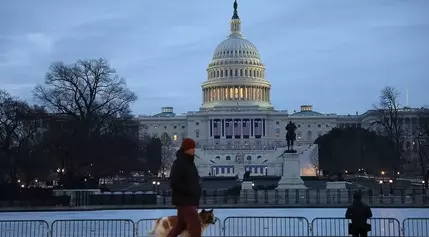In the lead-up to the inauguration of President-elect Donald Trump, a notable influx of prominent business figures, particularly from the tech industry, is set to converge on the nation's capital. This event highlights the growing importance of technology leaders in shaping both political and economic policies. Over the past few months, several executives have engaged with Trump, showcasing their willingness to collaborate with the incoming administration. Notable attendees include Walmart CEO Doug McMillon, Tesla and SpaceX CEO Elon Musk, Meta’s CEO Mark Zuckerberg, Amazon’s CEO Jeff Bezos, and others. The presence of these influential figures underscores a shift in corporate strategy towards aligning with government initiatives.
Tech Titans Prepare for Presidential Inauguration
In the crisp, early days of January, Washington D.C. is abuzz with anticipation as leading figures from the tech world prepare to attend the inauguration of the 47th President of the United States. The event marks a pivotal moment where industry giants will gather to signal their support and collaboration with the new administration. Among those confirmed to be present are some of the most influential CEOs in the tech sector, including Doug McMillon of Walmart, who recently discussed U.S. investment and trade relations with the president-elect.
Elon Musk, known for his innovative ventures in electric vehicles and space exploration, has expressed his honor at participating in this historic occasion. He has previously spoken at official events organized by the incoming president, reinforcing his commitment to working alongside the administration. Joining him will be Vivek Ramaswamy, an entrepreneur focused on reducing government spending, and other key figures like Shou Zi Chew of TikTok, Tim Cook of Apple, and Sundar Pichai of Google.
Notably, Mark Zuckerberg of Meta has made significant efforts to mend fences with Trump, reversing some of the company's progressive policies. Similarly, Jeff Bezos, owner of The Washington Post, has navigated past tensions with the president-elect, especially regarding media coverage. While many tech leaders are attending, some notable absences include James Quincey of Coca-Cola and Jensen Huang of Nvidia, who have opted out due to other commitments.
This gathering represents a critical juncture where the lines between technology, politics, and economics blur, setting the stage for potential collaborations that could shape the future of American policy and innovation.
From a journalistic perspective, this event signifies a turning point in the relationship between the tech industry and the federal government. The attendance of these high-profile executives suggests a renewed focus on aligning corporate strategies with national priorities. It also reflects the increasing influence of technology companies in shaping public policy, signaling a new era of cooperation between Silicon Valley and Washington D.C. As these leaders convene, it will be fascinating to observe how their interactions may influence future legislation and economic policies.



















